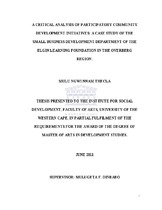| dc.description.abstract | Development thinking in the 21st century has embraced the challenge to inform development practice towards managing the relationship between the macro and micro level of development with an emphasis on people-centred development (PCD) and a participatory development approach (PDA). People-centred development advocates a process focused on people, which enables beneficiaries of communitydevelopment initiatives to empower themselves through participation. People-centred development has been universally accepted in the development community as the only viable option, with the potential to reverse decades of top-down approaches to development through the engagement of community stakeholders in a meaningful participation process. The social development scene in South Africa is characterised by a strong presence of the civil society in general and non-governmental organisations (NGOs) in particular, which are major role players in socio-economic development at the grassroots. Most of these organisations are committed to participatory development methodologies in order to meet the needs of povertystricken communities in South Africa. This thesis critically assessed participatory development in the Small Business Development Departments (SBDD) programmes/projects at the Elgin Learning Foundation, in the Overberg district of the Western Cape. A qualitative research methodology was applied throughout the study. This research approach was chosen because the purpose of this project was to understand and describe community participation at the SBDD from an insider perspective, and not to predict social action or make generalisations about it. Accordingly, observation, in-depth interviews, documentary analysis, and focus-group discussions were utilised for data collection. The study also used secondary sources of information, namely policy briefs, project proposals, annual evaluation reports, and minutes of meetings. The findings indicate that the community-development activities of the SBDD are very visible in the Overberg region, and that the organisation maintains good relationships with community stakeholders. In addition, the department contributes significantly towards entrepreneurship and skills development in the community, through its training and mentorship programmes. However, results also suggest that community-development at the SBDD is not always people-centred because training programmes are largely externally designed, monitored and evaluated, without taking into consideration the felt needs of the people. Participation that is perceived as a means to an end, rather than an end in itself can be described as tokenistic. In this light, the study recommends that the SBDD develops context-specific strategies to implement participatory methodologies at all stages of project-cycle management, in order to provide an enabling environment for the genuine participation of people at the grassroots. This approach can empower community members and build local institutional capacities to ensure project/programme sustainability in the long term. | en_US |

